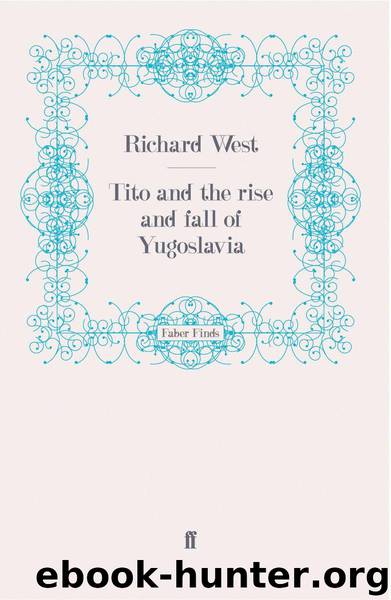Tito and the Rise and Fall of Yugoslavia by Richard West

Author:Richard West [West, Richard]
Language: eng
Format: mobi
ISBN: 9780571281107
Publisher: Faber and Faber
Published: 2012-11-14T22:00:00+00:00
they’d make you trim your sonnet to appease
the triple tyrant and the Piedmontese.
‘Why for some peasants vex a friendly power?
We’d like to print it, but Sir Tottenham Bauer
and half the Board would blame us. Colleen Cheese
would stop its front-page ad. They’re strong RCs.
It’s old stuff now, and truth, deferred goes sour …29
Notes
Britain was largely responsible for forcing at least 30,000 Yugoslavs to return to their deaths at the hands of Tito’s Partisans. Britain was also largely responsible for not sending back Ustasha war criminals such as Ante Pavelić. Thanks to the secrecy of the British government, both these shameful matters are still obscure. Some writers on the forced repatriations to Yugoslavia and the Soviet Union have been carried away by indignation, and muddied the issue with wild allegations. I have relied mostly on Cowgill et al., The Repatriations from Austria in 1945: The Report of an Inquiry. One of the three authors of this report, the journalist Christopher Booker, pursued his inquiries further and wrote his own separate book, which has not yet been published. He concludes that most of the Yugoslavs were shot on the orders of Tito, after a vengeful speech at Ljubljana.
A Yugoslav historian, Bogdan Krizman, has written a book on the Ustasha in exile, Pavelić u bjekstvu, and their activities are also mentioned by Antun Miletić in his books on Jasenovac concentration camp. Hubert Butler made a special study of the escape of Andrija Artuković, the ‘Yugoslav Himmler’. The Australian broadcaster Mark Aarons’s Sanctuary: Nazi Fugitives in Australia describes in chilling detail the activities of the Ustasha in Australia, supplementing an earlier book by three other authors on the clandestine element in Australian politics, Rooted in Secrecy. Aarons also collaborated with John Loftus, a former attorney with the US Justice Department, to write Ratlines, the story of the escape of Nazi and Ustasha criminals after the Second World War. Many Ustasha war criminals and their friends and relations are now back in Croatia.
1 Stevan K. Pavlowitch, Yugoslavia (London, 1971), p. 177 n.
2 The pro-Serb Michael Lees also served on the commission.
3 Anthony Cowgill, Lord Brimelow and Christopher Booker, The Repatriations from Austria in 1945: The Report of an Inquiry (London, 1990), p. 14.
4 Ibid. p. 41.
5 Ibid. p. 44.
6 Ibid. pp. 81–2.
7 Interview with Christopher Booker.
8 Globus, 22 May 1992.
9 Mark Aarons and John Loftus, Ratlines (London, 1991), pp. 273–4.
10 Globus, 22 May 1992.
11 Croat Franciscans helped to arrange the escape of the German war criminal Klaus Barbie. See Aarons and Loftus, Ratlines, passim.
12 Bogdan Krizman, Pavelić u bjekstvu (Zagreb, 1986), p. 143.
13 See the essay ‘The Artuković File’ in Hubert Butler’s The Sub-prefect Should Have Held His Tongue and Other Essays (London, 1990).
14 Mark Aarons, Sanctuary: Nazi Fugitives in Australia, (Melbourne, 1989), p. 251. Apparently Luburić and the more extreme Ustasha broke away when Pavelić started to talk terms with émigré right-wing Serbs, trying to agree on a frontier between the two nations.
15 Milovan Djilas, Rise and Fall (London, 1985), p. 42.
16 Ibid. pp. 55–6.
17 Ibid.
Download
This site does not store any files on its server. We only index and link to content provided by other sites. Please contact the content providers to delete copyright contents if any and email us, we'll remove relevant links or contents immediately.
The Unsettlers by Mark Sundeen(1682)
1610396766 (N) by Jo Ann Jenkins(1671)
Reclaiming History by Vincent Bugliosi(1342)
When the Astors Owned New York: Blue Bloods and Grand Hotels in a Gilded Age by Justin Kaplan(1332)
The House Of Medici by Christopher Hibbert(1331)
Reds by Ted Morgan(1162)
The Creation of Anne Boleyn by Susan Bordo(1056)
The Compton Cowboys by Walter Thompson-Hernandez(1044)
Diplomacy by Henry Kissinger(1002)
Abraham Lincoln: A Life, Volume 2 by Michael Burlingame(969)
Four Great Americans: Washington, Franklin, Webster, and Lincoln (Yesterday's Classics) by Baldwin James(967)
Japan by Edwin Reischauer(956)
The Vindications by Mary Wollstonecraft(943)
The Bully Pulpit: Theodore Roosevelt, William Howard Taft, and the Golden Age of Journalism by Goodwin Doris Kearns(930)
2020-08-04 17:03:28.438602 by Unknown(928)
101 Things You Didn't Know About Lincoln by Brian Thornton(910)
English Verbs by Collins(904)
Two Americans by William Lee Miller(899)
Confederates in the Attic by Tony Horwitz(899)
